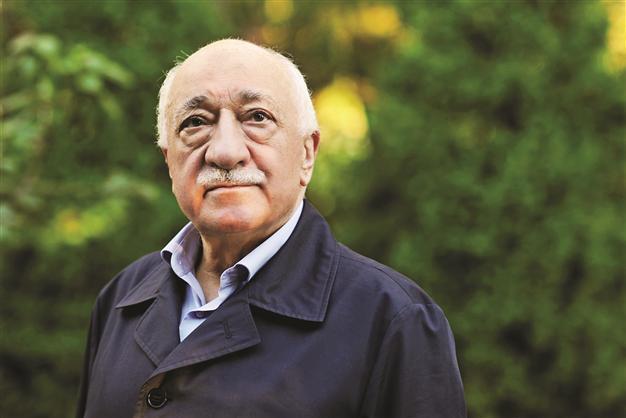Government-Gülen fight spills onto front pages
ANKARA

Islamic scholar Fethullah Gülen is seen in this file photo. CİHAN Photo
The bitter ongoing dispute between the Turkish government and the movement of Islamic scholar Fethullah Gülen has escalated to the front pages of daily newspapers, with both sides bidding to refute each other’s claims over the government’s alleged secret moves to put an end to the Gülen Movement’s activities.Contrary to official claims, the government blacklisted all institutions owned by followers of Islamic scholar Fethullah Gülen in line with a National Security Council (MGK) decision in August 2004, on the basis of their “relations with fundamentalist groups,” daily Taraf reported Dec. 1.
Taraf had revealed last week that an action plan was recommended and was signed by the government during the same MGK meeting.
Government officials have argued so far that the MGK decision was never enforced and was therefore “null and void.”
However, on Dec. 1 Taraf revealed documents showing that the Prime Ministry Monitoring and Coordination Board (BUTKK), working under former Prime Ministry Undersecretary Ömer Dinçer, had blacklisted all private prep schools, dormitories, schools and institutions owned by the Gülen Movement, known in Turkish as the “Cemaat” (Community) or “Hizmet” (Service).
Almost the entire front page of Taraf was allocated to the story. The very same issue was widely reported by pro-government Star and Yeni Şafak dailies on the same day, but with a considerably different angle.
The headline of Star stated that “Not a single pious person had a headache,” quoting Dinçer.
“The pressure was directed toward terror with an additional plan. No imposition was put on any pious person or institution during our term. We acted as a shield against pressures that were reminiscent of the Feb. 28 [1997’s post-modern coup]. We took a big risk,” Dinçer said.
Yeni Şafak daily, meanwhile, reported that an action plan against fundamentalism had gone into force in line with a decision made at an MGK meeting in 2000, when late-Prime Minister Bülent Ecevit led a coalition government. The BUTKK was established at the time in order to monitor the implementation of the plan. However, in 2004, Dinçer ordered that only terror groups involved in violence should be listed, the daily said.
Yeni Şafak also quoted Dinçer, who said the government had actually taken a risk under the conditions of the time, by protecting Gülen.
However, Gülen himself has described himself as “speechless” and expressed his dismay over the MGK decision. He said that if the government had not undertaken steps to change the status of the test prep schools, a move strongly denounced by his movement and its media outlets, he would have “given the benefit of the doubt” and considered the document something “circumstantial.”
“What was required for the benefit of the doubt was this: We don’t know the conditions of the time. We weren’t related to the matter so we can know its background and assess it with its own philosophy. This is how I would have looked at it, if there had not been a continuation,” Gülen said in statements released on his website, herkul.org, on Nov. 30. These statements were printed on the front page of daily Zaman, which is close to Gülen, on Dec. 1.
According to the report, the BUTKK drafted a blacklisting report each month. These reports were drafted by employees of the Education Ministry upon orders from Dinçer and were later sent to the Prime Ministry with stamps of “secret” on them. Taraf said the most recent such document that it had was from 2010.
One of the documents published by the daily shows that a number of private schools owned by Gülen supporters were inspected by the Education Ministry, with ministry files classifying these inspections as “routine inspections.” However, in a file sent by the ministry to the prime ministry, the reason for the inspections is described in a “secret” document as “[the schools’] relations with fundamentalist groups.”
Tension between the government and the Gülen Movement recently bubbled to the surface after Prime Minister Recep Tayyip Erdoğan announced plans to abolish private examination prep schools (dershanes), many of which are financed and run by Gülen’s followers. Erdoğan described the group’s loud objections to his government’s plans as “a smear campaign.”
The issue is expected to be discussed during Dec. 2 Cabinet meeting as well.
Erdoğan sues Taraf, Uslu
In a related development, the prime minister has filed a case against Taraf and its columnist, Emre Uslu. Erdoğan is claiming compensation worth 50,000 Turkish Liras for non-pecuniary damages, arguing that Uslu “attacked [Erdoğan’s] personal rights” in a column published on Nov. 21.
In the petition, lawyers for the prime minister also quoted Uslu’s column, titled “Close Them All,” stating that he had used terms such as “jackal, dissolute, liar, traitor; different in front and different behind the curtain,” Anadolu Agency reported on Dec. 1.
“The defendant could write an effective article without using these severe expressions and could still fulfill his goal of serving the press. However, this is not the goal of the defendant. His goal is to insult our client in the harshest way,” the petition read, arguing that the publication of the column constituted “an open attack on the personal rights and moral character” of Erdoğan.
A separate complaint has also been filed against Uslu on “insult” charges, and the opening of a public case against him has been sought, Anadolu Agency also reported.
















